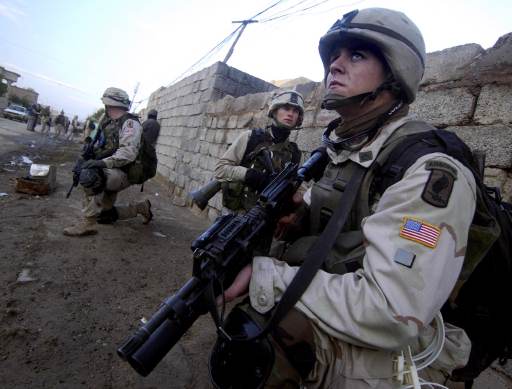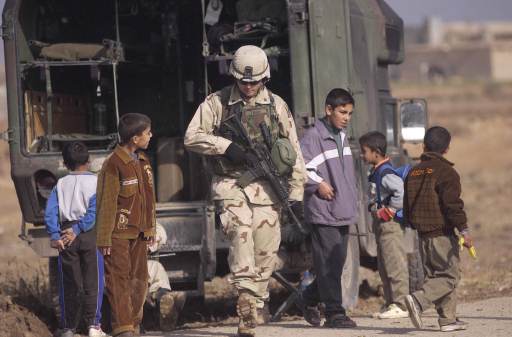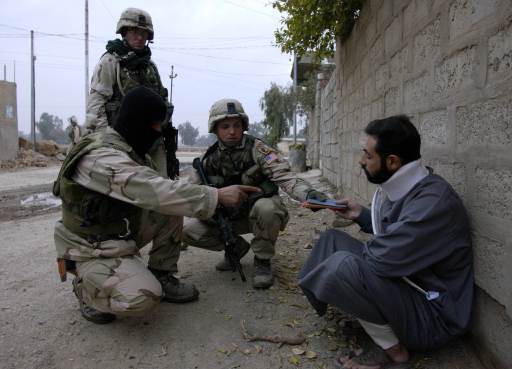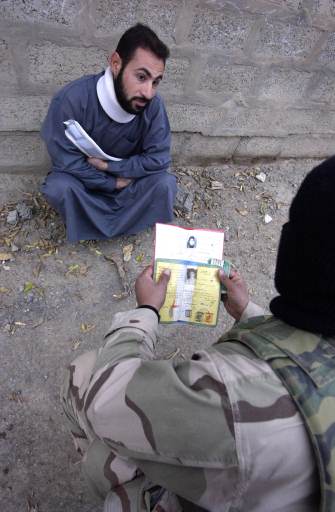US troops have detained the private secretary of Saddam Hussein's fugitive deputy, Izzat Ibrahim al-Douri, during a massive sweep in the Iraqi town of Hawijah.
"Saad Mohammed al-Douri was arrested in a house in the Hawijah area, where he was hiding," police chief Awad al-Obeidi told AFP.
Kirkuk's police chief, General Turhan Yusef, said $US40,000 ($55,134) was found in the man's possession, which was "suspected of being used to finance attacks on the US-led coalition".
The police general said more than 100 people were arrested across north-central Iraq in what he described as a "one-off operation aimed at finding Izzat Ibrahim based on specific intelligence".
Six Iraqis were wounded as several villages put up resistance to the massive cordon and search sweep.
General Yusef said the blockade around Hawijah, a town of 80,000 people 45 kilometres to the west of Kirkuk, was lifted after 16 hours.
An official of the Patriotic Union of Kurdistan, the dominant Kurdish faction in Kirkuk, said a former general in the disbanded Iraqi army was also arrested in the raids.
He also said Hamid Saad, a senior official of Saddam's former ruling Baath party in charge of youth and student affairs, was captured.
 |
Soldiers with the 173rd Airborne Brigade, 4th Infantry Division, pull security on the streets of Al Hawijah, Iraq, during Operation Bayonet Lightning, Dec. 2, 2003. Bayonet Lightning is a joint operation to locate and question persons of interest in the city.
(DoD photo by Staff Sgt. Jeffrey A. Wolfe, U.S. Air Force) |
The official, Jalal Jawrar, said an arms cache and attack plans were found in the general's home.
Other detainees included former member of the ultra-loyalist Saddam Fedayeen militia and middle-ranking army officers.
The operation by 1200 troops from the 173rd Airborne Division was concentrated on Hawijah and the village of Rashad, 60 kilometres to the south of Kirkuk.
The operation's commander, Colonel William Mayville, told AFP 27 people were arrested and seven rocket-propelled grenades, 56 Kalashnikovs and several improvised explosive devices of the sort favoured by anti-US insurgents were seized.
Those arrested in the raid were assembled on a roadside and had their heads covered in yellow bags.
Hawijah resident Marwan Mohammed Hawijah said that at 5am, as he got up to go to prayers, he saw a convoy of 200 transports enter the town.
"They had lists of suspects with photographs attached and they were accompanied by Iraqis," he said.
There was no immediate word on the results of the other operations.
 |
A soldier with the 173rd Airborne Brigade, 4th Infantry Division, heads back to work after visiting with a group of Iraqi children during a cordon and search mission in Al Huweja, Iraq, Dec. 2, 2003.
(DoD photo by Spc. Clinton Tarzia, U.S. Army) |
Earlier, a member of the US-installed Iraqi Governing Council, Muaffak al-Rubai, told Al-Jazeera satellite television a "major figure" from Saddam's former regime had been "killed or captured" in the Kirkuk region.
"Among the people arrested or captured, is a big fish ... a major figure whose identity is being verified," he said, when asked about al-Douri.
A Kirkuk police official said part of the search focused on al-Douri's eldest son, Ahmed, based on new intelligence he was in the area.
US commanders had reports he was transmitting orders from his father to two, 250-man insurgent brigades under his command.
The official, who spoke on condition of anonymity, said several members of the brigades had been captured in the overnight raids.
 |
Soldiers with the 173rd Airborne Brigade question a suspect in Al Hawijah, Iraq, during Operation Bayonet Lighting, Dec. 2, 2003. Bayonet Lightning is a joint operation to locate and question persons of interest in the city.
(DoD photo by Staff Sgt. Suzanne M. Jenkins, U.S. Air Force) |
Some were members of Saddam's intelligence service and others from his now disbanded army, many of whom have voiced anger with the US-led coalition over the slow progress in integrating them into a new defence force.
The police official also said that US soldiers overnight raided the home of the head of the Al-Sawalha tribe in the village of the same name, 75 kilometres south of Kirkuk.
He said US reports suggested that al-Douri had stayed with Sheikh Nuzhan Abed Mutlak at least four times since the fall of Saddam's regime in April.
The new intelligence resulted from the capture in a Mosul coffee shop on Sunday of two former generals of Saddam's elite Republican Guard, the official said, naming one of them as General Dia al-Douri.
Police in Mosul, the biggest town in northern Iraq, said the two generals were suspected of links to the Saddam aide.
 |
A soldier with the 173rd Airborne Brigade checks the identification card of a man in Al Hawijah, Iraq, during Operation Bayonet Lighting, Dec. 2, 2003. Bayonet Lightning is a joint operation to locate and question persons of interest in the city.
(DoD photo by Staff Sgt. Suzanne M. Jenkins, U.S. Air Force) |
The Kirkuk police official said the arrest three weeks ago of a local tribal chief, Ali Hussein Saleh, sheikh of the Jawada tribe, had led to the arrest of one of al-Douri's wives and a daughter on November 26.
The detention of the two women, along with the son of al-Douri's doctor, in a raid on a house in Samarra, north of Baghdad, came just a week after US commanders posted a $US10 million bounty on the fugitive former No. 2.
No. 6 on the US wartime list of most wanted Iraqi officials, al-Douri is the highest-ranking official of the former regime still at large, apart from the ousted president himself.
The northern region between Samarra and Kirkuk is overwhelmingly Sunni Muslim and its population fared relatively well under Saddam's Sunni-dominated regime.